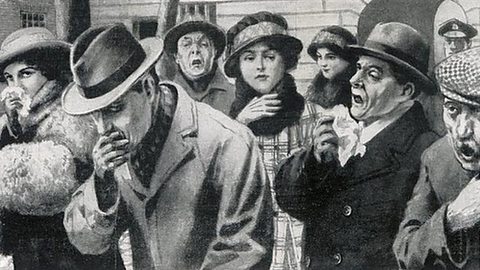Watch: The life of Walter Tull
Watch this animation for a short summary of Walter Tull's life and career.
NARRATOR: Walter Tull. Soccer Soldier.
Walter was born in Folkestone, Kent in 1888.
He grew up in a children’s home in London after his parents died.
After leaving school he became a printer’s apprentice.
But his real love was football.
Walter started playing for Clapton before joining Spurs.
At 21 he was only the second black football league player.
He went on to play for Northampton Town but when war was declared in 1914, Walter joined the Footballers’ Battalion.
[WHISTLE]
Walter was sent to France and took part in many battles.
In 1917 he was made an officer and became the first black officer to lead white British soldiers into battle.
In 1918 the German army was making a last effort to win the war.
On 25 March, Walter led an attack across no man’s land where he was hit and killed.
Walter is remembered by his football clubs and was also awarded the 1914-15 star and the War and Victory medals.
Walter Tull was both a professional footballer player and a soldier during World War One.
Walter had to give up his career as a footballer to help out in the war, but he then became recognised as the first black officer to lead white British soldiers into battle.
Walter Tull’s family
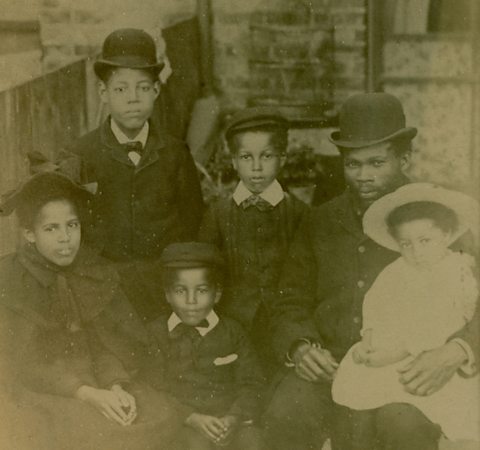
Walter Tull was born in Folkestone, Kent on the 28 April 1888.
Walter came from a mixed-race family. His mother, Alice, was a Folkestone local. His father, Daniel, moved from Barbados to England. He married twice and had six children.
After Daniel's death in 1897, Walter's stepmother had to move Walter and his brother Edward to an orphanage in East London.
The city was busy and noisy. It was very different to the farms and countryside Walter was used to.

Walter’s life as a footballer
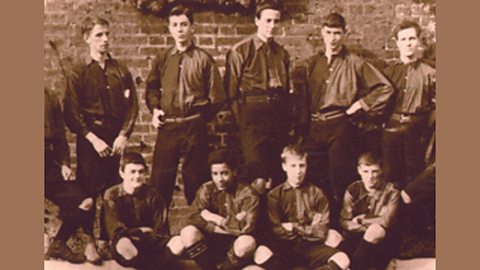
Image caption, Walter discovered a love for football at an early age
While at the orphanage Walter played a range of sports, including football and cricket. He is pictured here with the orphanage football team. He would go on to play professionally for Tottenham Hotspur.
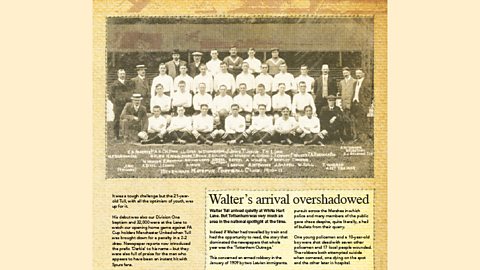
Image caption, Walter played football for Tottenham Hotspur
After school Walter played for amateur team Clapton Football Club. He was good enough to join Tottenham Hotspur, one of London's top professional teams. (Image from an article by John Fennelly in Hotspur magazine.)
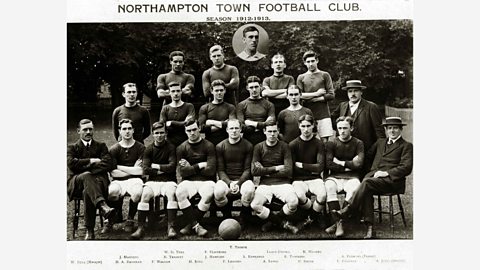
Image caption, Walter moved to Northampton Town Football Club
Although people commented on his cool play and accurate passing, Walter lost his place at Tottenham. He moved to Northampton Town Football Club where he was successful, playing 110 matches during his time there.
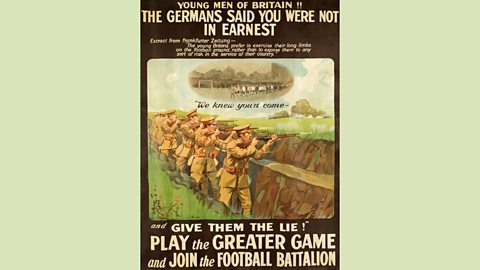
Image caption, Walter joined the Football Battalion when the war began
Professional football was suspended until after the war was over. Walter and many other footballers decided to join the Football Battalion. A battalion was a main fighting unit with around 1,000 men.
1 of 4
Walter becomes a soldier
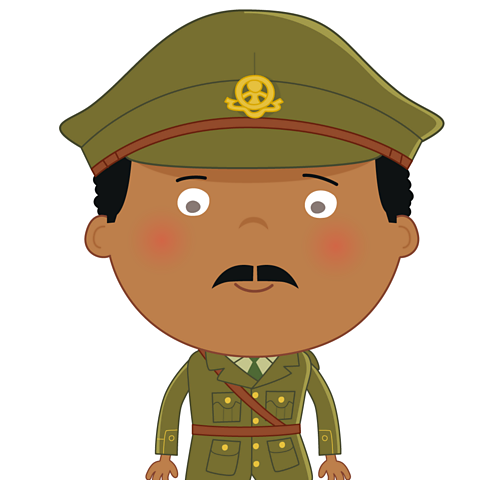
Walter had a successful career during the war.
He was quickly promoted to the rank of Sergeant in the Football Battalion.
In 1916 Walter moved back to England and began training as an Officer.
At this time, only a white, British-born person could be trained to be an Officer.
Walter became an exception to these rules and was allowed to continue his training.

Walter the officer
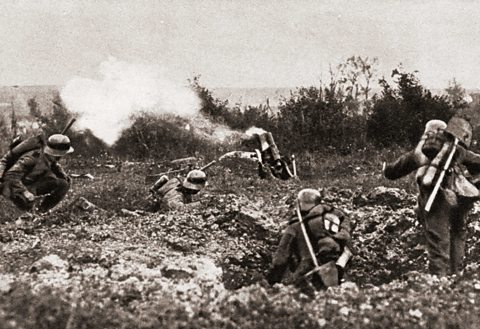
In May 1917 Walter was ‘commissioned’ to the rank of Officer.
Walter was highly praised for his role in battle, notably for leading soldiers over a river in Italy.
On the 25 March 1918, Walter led an attack on German trenches.
They had to cross 'No Man's Land', which was open ground and under fire from German machine-guns.
Walter was hit and killed. His body was never found.

How do we remember Walter?
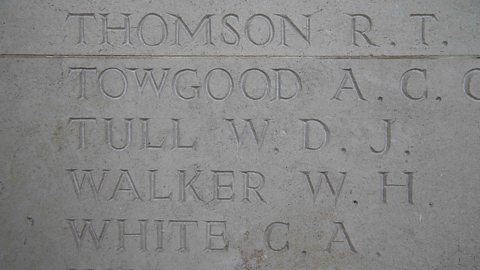
Image caption, Walter's name is on the Arras Memorial
The Arras Memorial in France commemorates around 35,000 servicemen who lost their lives between the spring of 1916 and the 7 August 1918, who had no known graves.
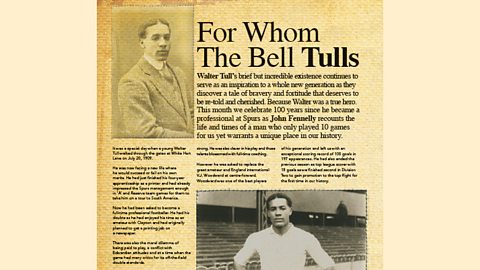
Image caption, Walter is remembered by his football clubs
Walter's life and career was celebrated in this article written by John Fennelly that appeared in the Tottenham Hotspur monthly magazine 'Hotspur'.
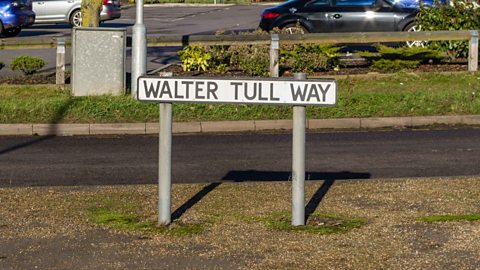
Image caption, A road in Northampton was named after Walter
A road leading to Northampton Town's football stadium was named after Walter because of his success and service to the team.
1 of 3
At the time, Walter’s death didn’t gain much media attention. Only recently has his story been told including a campaign to have him awarded the Military Cross medal.
It’s important to understand that he wasn’t the only Black British officer that served during the war but he was the first to lead soldiers on the front line of the conflict.
Activities
Activity 1: Quiz – Walter Tull's life
Activity 2: History Explorer game
Play this game to test your knowledge and learn even more facts about World War One.
History Explorer: Secrets through time
History Explorer: Secrets through time: KS2 History
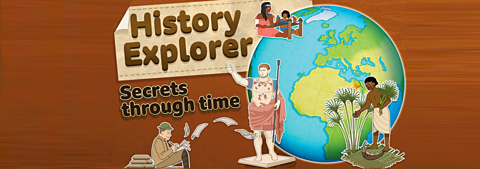
SAT’s preparation resources. activitySAT’s preparation resources
Get ready for the SATs papers with videos, activities, quizzes and games to refresh your knowledge and practise your skills.

More on World War One
Find out more by working through a topic
- count8 of 43

- count10 of 43
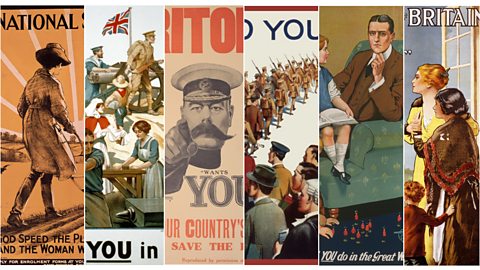
- count11 of 43
